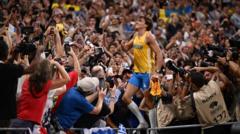Will Climate Change Force a New Calendar?

Published: 2025-09-22 06:25:12 | Category: sport
At the recent World Athletics Championships in Tokyo, athletes faced extreme conditions while competing, prompting discussions about the need to reshape the global calendar of Olympic sports due to climate change. World Athletics President Sebastian Coe highlighted the struggles athletes experienced, particularly in endurance events, and suggested that future competitions might require rescheduling to protect athletes from unsafe conditions. A standout moment of the championships was Armand Duplantis' world-record pole vault clearance, showcasing the thrilling performances despite the challenging environment.
Last updated: 07 October 2023 (BST)
- World Athletics is considering a re-engineering of the event calendar due to climate change.
- Extreme temperatures in Tokyo posed challenges for athletes, especially in endurance events.
- Armand Duplantis achieved a remarkable 14th world record during the championships.
- The Ultimate Championships will debut in Budapest next year with a £7.5m prize fund.
- Technological advancements in equipment and training are contributing to elevated performance levels.
Climate Change Concerns in Athletics
The World Athletics Championships in Tokyo were marked not just by outstanding athletic performances but also by the severe weather conditions athletes faced. With temperatures soaring above 30°C and humidity levels exceeding 90%, many participants reported significant impacts on their training and competition. According to research by World Athletics, about 70% of athletes indicated that climate change is affecting their performance.
Coe stressed that addressing these issues is imperative. He noted that despite the challenges, governments have not taken adequate action to mitigate the effects of climate change on sports. As the climate crisis intensifies, the need for a revised international calendar becomes increasingly pressing, particularly for endurance events such as marathons.
The Push for Calendar Reforms
Coe's vision for the future includes potentially holding endurance events at different times of the year or in cooler locations. This proposal raises logistical questions, especially when considering the availability of suitable cities during autumn and winter months when temperatures can still be high. However, he believes that a proactive approach must be adopted to safeguard athletes' health and performance.
Key Highlights from the Championships
Despite the adverse conditions, the World Championships featured remarkable performances, with many athletes showcasing their talent on the world stage. One of the most talked-about achievements was that of Armand Duplantis, a Swedish pole vault sensation, who cleared an astonishing height to secure his 14th world record. This feat not only solidified his status in the athletics community but also captivated audiences worldwide.
Other Notable Performances
Besides Duplantis, several other athletes delivered extraordinary performances:
- Sydney McLaughlin-Levrone: Almost broke the women’s 400m world record, showcasing her prowess in the event.
- Noah Lyles: Emulated Usain Bolt's legacy by winning his fourth consecutive world title in the 200m.
- Faith Kipyegon: Made history by clinching her fourth world title in the 1500m, further establishing her dominance in the sport.
The high level of competition was accompanied by discussions on how to improve the sport's future. Coe expressed optimism regarding athletics' appeal, noting an increase in following and engagement from fans. However, he acknowledged that more must be done to ensure that athletes are adequately rewarded for their efforts.
Introduction of Gene Testing in Women's Events
In another significant development at the Championships, Coe confirmed that all female athletes underwent gene testing as part of ensuring fair competition. This testing process, which involves a simple cheek swab, aims to address ongoing concerns regarding eligibility and fairness in women’s events, particularly in light of the increasing number of athletes who may have undergone male puberty.
While the specifics of any athletes who may have faced exclusion due to this testing will remain confidential, the introduction of gene testing marks a substantial shift in how sports organisations are addressing complex issues around gender and competition.
The Ultimate Championships: A New Era for Athletics
Looking ahead, the inaugural Ultimate Championships is set to take place in Budapest next year. This new event aims to bridge the gap between major championships, offering a platform for top athletes, including world champions and Diamond League winners, to compete for a substantial prize fund of £7.5m. Coe has suggested that this format could serve as a testing ground for innovative ideas that may later be integrated into established events.
Coe's vision for the Ultimate Championships reflects an understanding of the need for change within athletics. By providing a fresh format and significant rewards, the event seeks to attract a broader audience and elevate the sport's profile on a global scale.
Technological Advances in Athletics
The championships also highlighted the role of technology in enhancing athletic performance. Coe attributed some of the jaw-dropping performances to advancements in synthetic track surfaces and the evolution of footwear. These innovations, combined with improved coaching techniques, have contributed to a new era of athletic achievement.
As the sport continues to evolve, Coe emphasised the importance of ensuring that athletes benefit from the growth of athletics, particularly in terms of prize money and sponsorship opportunities. The need to provide sufficient financial support for athletes remains a pressing concern as the sport seeks to thrive in an increasingly competitive landscape.
Conclusion: A Bright Future Amidst Challenges
In summary, the recent World Athletics Championships in Tokyo not only showcased extraordinary athletic talent but also underscored the pressing challenges posed by climate change and the necessity for reforms in the sport. With the introduction of new events like the Ultimate Championships and a commitment to athlete welfare, there is hope for a more sustainable and equitable future in athletics.
As the athletics community reflects on the outcomes of the Championships and the implications for the future, it raises thought-provoking questions: How can the sport adapt to the changing climate while ensuring fair competition? Will the innovations introduced during these Championships pave the way for a new era in athletics? Only time will tell, but the potential for growth and improvement is undeniably present. #Athletics #WorldChampionships #ClimateChange
FAQs
What were the weather conditions like at the World Athletics Championships in Tokyo?
The weather conditions were extreme, with temperatures exceeding 30°C and humidity levels above 90%, significantly impacting athletes' performances, especially in endurance events.
Why is World Athletics considering changes to the competition calendar?
World Athletics is considering changes to the competition calendar due to the adverse effects of climate change on athletes' performance and health, particularly in endurance events.
What notable records were set during the Championships?
Armand Duplantis set a new world record in pole vaulting, marking his 14th record-setting achievement. Other notable performances included Sydney McLaughlin-Levrone and Noah Lyles winning their respective events.
What is the Ultimate Championships?
The Ultimate Championships is a new event scheduled for next year in Budapest, aiming to feature top athletes and offer substantial prize money while bridging the gap between major competitions.
What is the purpose of gene testing for female athletes?
Gene testing for female athletes aims to ensure fair competition by addressing concerns regarding eligibility and participation of athletes who may have undergone male puberty.



